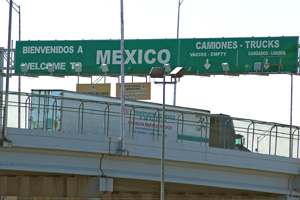ATA, Farm Groups Welcome U.S.-Mexico Cross-Border Trucking Agreement

American Trucking Associations and several agricultural organizations said they welcomed the cross-border trucking agreement signed between the United States and Mexico on Wednesday.
ATA President Bill Graves said the group “welcomes this latest step in improving the efficiency of trucking and trade at our southern border. By signing this historic agreement, the U.S. and Mexico have laid the groundwork for continued economic growth on both sides of the border.”
He added that “Mexican fleets participating in the program will be bound by the same rules and regulations applicable to American carriers, and we are pleased that the agreement allows for U.S. carriers to compete in Mexico.”
The Owner-Operator Independent Drivers Association, by contrast, was quick to criticize the agreement, said its members were “fuming” about allowing Mexican trucks free access to U.S. roads.
The Teamsters union also issued a statement blasting the plan, saying it “endangers America’s highway safety, border security and warehouse and trucking jobs.”
Teamsters General President Jim Hoffa said the program was “probably illegal” because it grants permanent operating authority to Mexican trucks after an 18-month pilot program.
He criticized the U.S. Department of Transportation for using money from the federal Highway Trust Fund to pay for electronic onboard recorders for Mexican trucks, questioning whether DOT pay for the EOBRs legally.
U.S. farm-products groups praised the plan, saying Mexico’s lifting of tariffs as required by the agreement will help boost U.S. exports. Mexico bought $14.5 billion in U.S. farm products last year, the Los Angeles Times reported.
Agricultural exports, which support 1.1 million U.S. jobs, have been strong this year, increasing 25% to Mexico, U.S. Agriculture Secretary Tom Vilsack said, the Times reported.
The American Frozen Food Institute said the agreement “will immediately help restore some of the lost jobs and lost market access U.S. frozen food producers have suffered.”
Mexico had put a 20% tariff on U.S. frozen potato products in 2009, costing U.S. frozen potato product exporters more than $33 million in lost revenue, the group said in a statement.
The International Dairy Foods Association also applauded the agreement, saying it “will pave the way for an immediate 50% reduction in Mexico’s retaliatory tariffs on several dairy products.”




